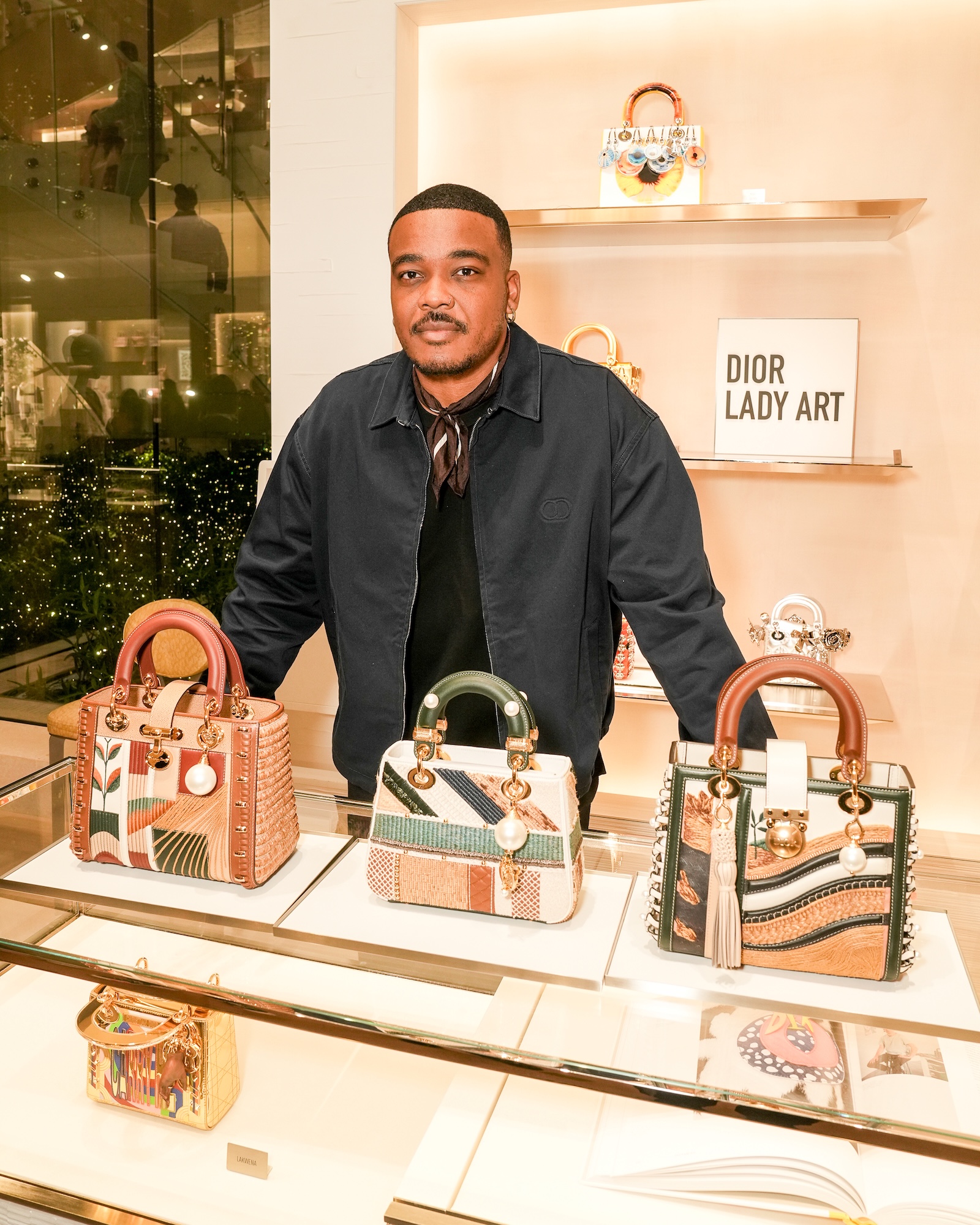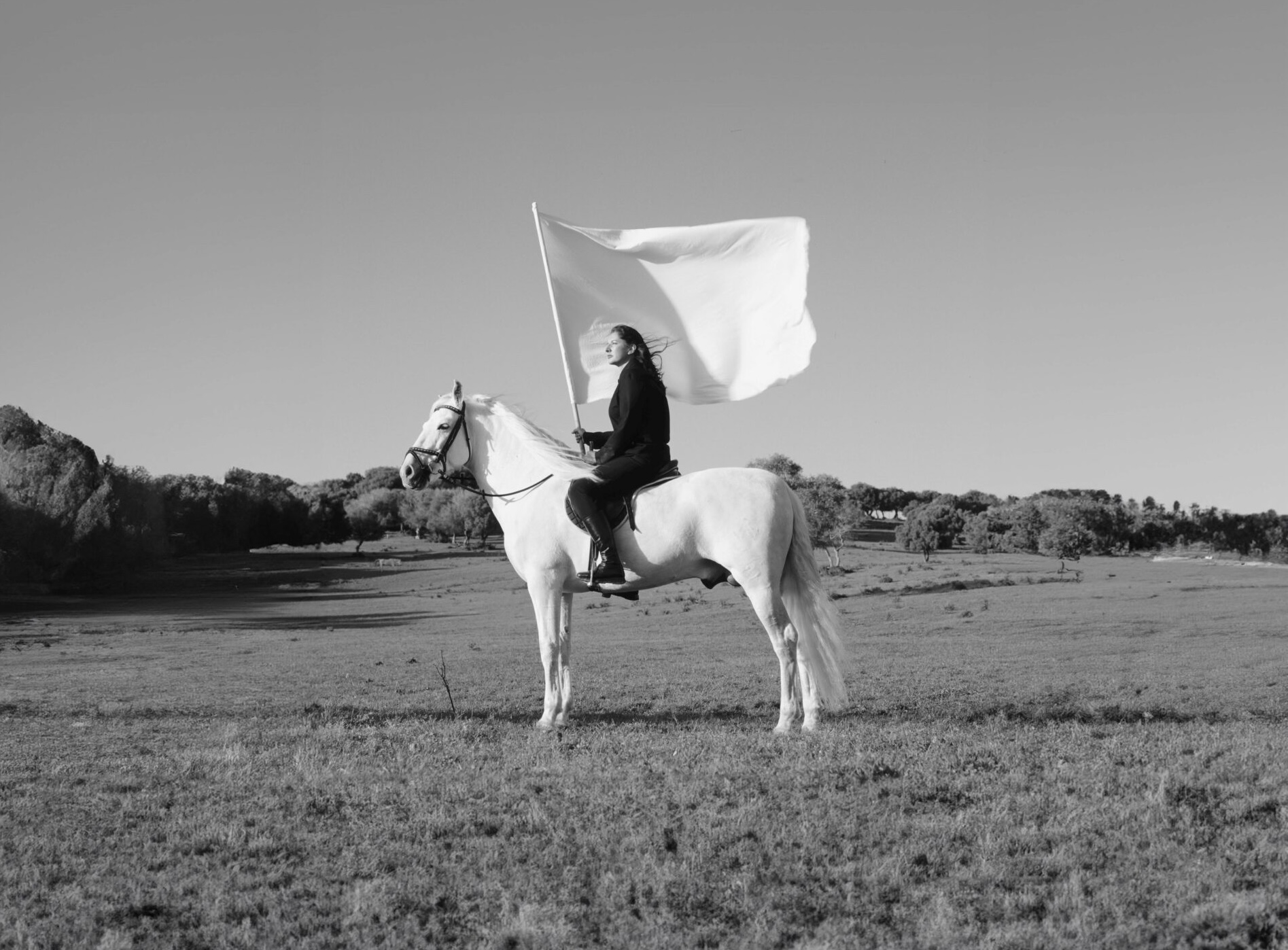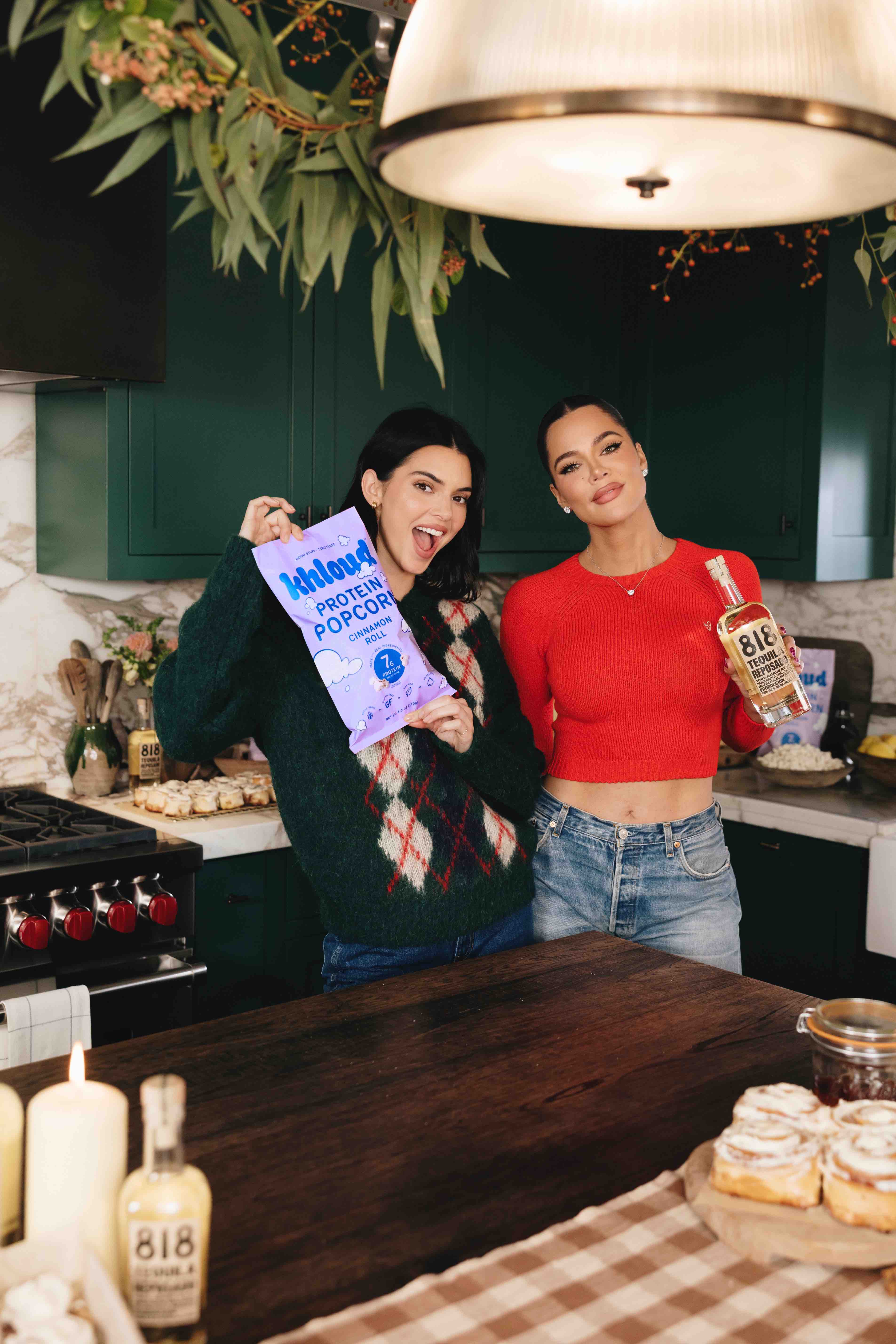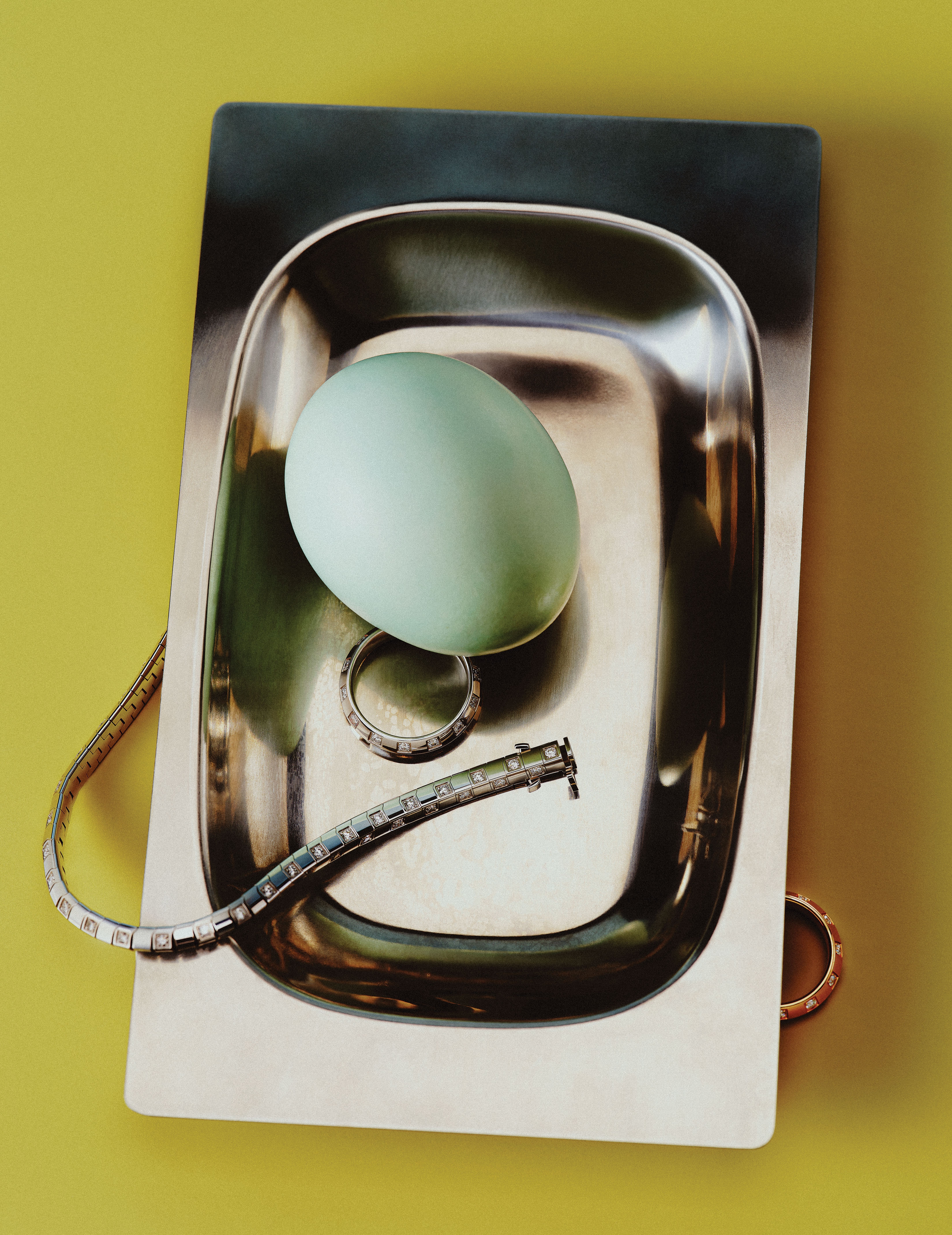Three years ago, in an essay titled “decolonizing my desires,” playwright Jeremy O. Harris, 29, talked about a recent play he penned that “explored a relationship between a 25-year- old black artist and a 65-year-old white art collector, to parse the ways I was cradled, coddled, and collected by white institutions, and how I’ve collected and used them in turn.”
That play, now titled _“Daddy,”_ premiered Off-Broadway as a co-production of The New Group and Vineyard Theatre at The Pershing Square Signature Center on February 12th, featuring actors Alan Cumming, Ronald Peet, Hari Nef, and Tommy Dorfman. _“Daddy”_ comes right on the heels of Harris’ incendiary _Slave Play_, recently wrapped on January 13th after a two-week extension to its first off-Broadway run, during which it seemed to scandalize and delight the theatergoing set in equal measure. The play, which explores the fraught intersections
of race, power, gender, and sexuality in 21st-century America through the lens of interracial relationships, has netted
Harris the Rosa Parks Playwriting Award and the 2018 Paula Vogel Award, while also receiving drop-ins from the likes of Madonna, Whoopi Goldberg, and Scarlett Johansson, along with miles of worshipful column space from critics.
Alongside these successes, Harris is soldiering through his third year as a graduate student at the Yale School of Drama, has appeared in a Gucci video series (a brand he appears to live in), and is currently adapting an upcoming screenplay, titled _Zola_, alongside writers Andrew Neel and Mike Roberts, based on the insane tell-all viral 2015 Twitter thread by Aziah Wells and the _Rolling Stone_ magazine piece that followed.
A week after _Slave Play_ closed, Harris took to Twitter
in response to a fellow queer black writer’s post on the importance of community over competition, saying, “... I’m not in competition with other playwrights, period. I’m
in competition with the limitations of the canon. I’m in competition with the limits of Jeremy O. Harris’ imagination.”
In testament to his collaborative ethos, Harris sat down with one of the leads from _“Daddy,”_ Ronald Peet, seen in
some of 2017’s most acclaimed films—_The Meyerowitz Stories (New and Selected), First Reformed_—and soon to appear in an intriguing Netflix sci-fi series, _The I-Land_. Among the topics of discussion: Harris’ meteoric ascent and the accompanying pressures, how _“Daddy”_ is actually a love letter to his mother, “digital natives,” and white people thinking it’s ok to touch his hair.
**Ronald Peet:** _“Daddy”_ **is the first play that you ever wrote, right? What does it feel like to see the set starting to come to life, and the staging that we’re doing right now and the rehearsal?**
**Jeremy O. Harris:** It was really the first play I wrote. In a lot of ways it’s really bizarre. Doing _Slave Play_ was really exciting because it was so immediate. It was like, I wrote it, then it got done at Yale, then it got produced at the O’Neill, then it immediately had a production in the city.
You don’t change as much in a year and half as you do in four years. I’ve changed a _lot_ in four years and I’ve thought about a lot of things differently and, like, I want to allow this play that I think is really beautiful to stay that play, while also recognizing how I’ve changed as a writer and how some of my interests have changed and even some of my understandings of melodrama have shifted. I’m in this weird mode where I don’t know how to rewrite, or if I should rewrite. I’m someone who very much believes that some of your first impulses are your best impulses. So, I don’t want to police the impulses of 25-year-old Jeremy, because 25-year-old Jeremy wrote this play and it excited him and a lot of other people. That play should still be allowed to be itself. It shouldn’t get a face lift just because I’m over it.


[**DRIES VAN NOTEN**](https://www.driesvannoten.be) jacket.
**You’re going to have many opportunities to write something new for 29-year-old Jeremy.**
Exactly. And every time I see it, everyday I’m in rehearsal, I’m loving it more. A lot of my anxiety I think is possibly because I’m still in mourning about _Slave Play_ being done. But every day that I have a separation from _Slave Play_ I’m like, No, I love this. A lot of my anxieties are gone. I also wondered, too, if some of my anxieties about where I am now compared to where I was then are anxieties about the success of my last play, and insecurity around working in a landscape where a narrative has been told about me.
**Those themes are, in a way, present in** _“Daddy”_ **—desiring an idea of success, and then coming into that idea, and then the way in which the reality does and does not fit what you expected. You’re on this meteoric rise, and when you’re inside of it it’s exciting, but you’re also like, ‘It just feels like I don’t where I am,’ and you wonder if the shoe is going to drop and when. But it hasn’t.**
Yeah, when is everyone going to realize that I’m actually just a fraud who’s only written like three plays, you know what I mean?
**Well, they’re not. But you hear, a lot of the time, people who have very long careers, and who create things that all of us look up to, they ask themselves that for the entirety of their career. So maybe that means that this is just the experience of doing it, of being it.**
As great as it is to have two plays happening in one season, it’s also like, ‘What the fuck?’ Maybe if I had more time to breathe I would not have this anxiety. I’m not someone who believes that critics define a work or your career, but I’m very protective of my collaborators and the work I do, so I think that it would be nice to not have as much pressure on my collaborators to succeed in some way that’s, like similar or even better than the thing I just did.
When everyone decided to work on this play with me, for the most part no one knew that I was working on a movie too...
How do you feel right now, having just finished your first TV show \[_The I-Land_\]? We talked about acting onscreen, and how that felt like a different muscle to start trying out.
**Definitely... I’m coming back and switching into this other mode that was originally more familiar to me, just doing theater, but there are times when we’re blocking that my instincts feel very close to the chest—less theatrical and more cinematic. I’m having to check myself and be like, ‘No, bigger, bigger, communicate,’ because the camera’s not right in front of your face. When you’re working day after day for two and a half months doing this kind of storytelling, and then you come to this other mode of storytelling, it is kind of a mindfuck—like, ‘Where am I? What instincts and impulses can I trust?’**
I noticed that.
**Yeah?**
Mhm. Your first couple of days, and I was like, “Is Ronald TV acting?” I was so confused because your voice was like _here_, I was like “Wait, Ronald knows he has to speak up, right?” But the last two days, you have been _in_ theater, and I was like, “Wow, that’s an adjustment.” Have you started to prefer one? Because I know that when I first did film I quickly learned that I kind of liked that more.


[**3.1 PHILLIP LIM**](https://www.31philliplim.com) suit and talent’s own necklace and bracelet.
**I think I have found it easier to disappear into a character when I’m doing film or TV versus theatre, because with theatre I’m always so aware of the audience’s presence. It’s kind of hard to just check them out and be with my scene partner. When I’m doing a film it doesn’t feel like a scene partner, it feels like a thing that’s happening, an interaction that’s happening, but on stage it always feels like a scene. We all know that this is a scene happening, I’m going to bring my full self, and it’s going to be honest, it’s going to be full—but it’s still a scene. Sometimes with film and TV, it can feel like you’re just living truthfully under the imaginary circumstances, and you forget that they’re imaginary circumstances, and it’s nice.**
And you get to travel. I just went to Tulum for New Years Eve and Christmas on a whim with a bunch of other friends. One thing I’ll tell you about Tulum is some of the food is amazing. Like Arca is the best restaurant. I heard Hartwood was great, but we couldn’t get a table, so fuck Hartwood! (laughs) But it was really annoying to be fully in a different country where everyone’s speaking English and all the tourists are fucking wealthy, annoying, American tourists. The amount of people who tried to touch my hair, I was like, this is crazy.
**Are you serious?**
None of the Mexican people tried to touch my hair, it was all white Europeans or Americans. So I want to go someplace that’s actually, truly different and truly a place where I can get to observe a different culture and exist within a different culture.
I want to go to Ghana and I really really really want to go to Seoul, Korea. I think I’m going to do that next year when I take my year off. . . I think it’s going to be really important for me to take a second to be a young adult just living his twenties, and to take some time for myself.
**The play’s called** _“Daddy.”_ **But you’ve said it’s a love letter to your mother.**
I didn’t really realize that until, \[playwright\] Amy Herzog told me that as she read it. She was like, so many male playwrights write these plays about their moms, and you can tell they hate their mom, but you wrote a play and all you can see is someone who loves their mom. Then she said, “This is a like love letter to your mom.”
**Wow.**
And as soon as she said that I was like, well, that makes complete sense, because there’s no way it couldn’t be. Part of the impulse of me writing it was to try and write a play that my mom would like.
I want to invite my mom into the fullness of my being. I want my mom to see a queer person as someone who
is not having normative sex, not that these are things that I’m doing, but these are potentials of my identity.
And those potentials are not scary or dark. And I think
that this play invited my mom into that world in a really exciting way, because there’s also this other character that counterbalances this and it gets to be her surrogate and her guide through the world, which I think is really fun.
I’m very lucky that there are a lot of really amazing queer playwrights who got to make impacts on the theatrical landscape in each of their generations. What I feel really lucky to be is someone who’s of a generation where I can truly invite everyone in. I don’t need to hide parts of my identity in order to be produced, and I think that we’ve all inherited that limitlessness.


[**PRADA**](https://www.prada.com/us/en.html) shirt. [**PRADA**](https://www.prada.com/us/en.html) turtleneck.
**Beautiful.**
Yeah. So it was a love letter to my mom in the sense that I didn’t come out to her properly. She asked me if I was gay, in a very loving way. She was like, You’ve had a secret. And
I was like, what do you want to know!? That sometimes I sleep with men? And she was like, Yeah, I just want you to be honest with me. Tell me who you are.
**What do feel the role of music is in your plays? In** _Slave Play_**, music is like another character. I feel like it serves as another character in** _“Daddy”_ **as well, but in a different way.**
I think when I first started writing plays I was obsessed with cracking the code of what millennial dramaturgy was like. What’s a play for a digital native, someone who grew up with the internet?
**A digital native. I love that term.**
How do we see the world and how do you dramatize
the way we see the world? And I think that we are one
of the only generations that truly have grown up with constant stimuli from music and porn and visual media and information. So there’s no other generation that has listened to music as consistently. We’ve been listening to music since Napster. So I think that for me, to deny that music is a part of the subconscious of my plays in the same way that it’s a part of my subconscious—I wouldn’t know how. I didn’t know how to write a play without having music be a part of it. I wanted all my plays to feel like someone had just turned on their computer. I also just love music. If I had been a more disciplined child, I would’ve been a musician probably. I played the piano, I played the saxophone.
**Me too, I played the saxophone. Which one, alto?**
Alto! Always. Duh!
**Tenor.**
You played the tenor sax!
**I played the tenor saxophone, that big ass thing.**
That’s insane!
**I took it to school everyday.**
That’s insane! Who has time for that? I was first chair.
**Of course you were.**
Yeah, but I would always quit after like two years. I would be good enough to get first chair and then I’d be like, I’m bored. But I always loved music.
**Would you ever consider writing lyrics and collaborating with people?**
Mm-hmm. I’ve written lyrics, yeah.
**Cool.**
I have a credit on two albums but I’m not going to tell you which ones.
**There are so many things I don’t know about you.**
* * *
Introduction by Sid Feddema and Miles Griffis
Photographer: [William Lords](https://www.instagram.com/williamlords/?hl=en).
Stylist: [Rika Watanabe](https://www.instagram.com/rikawatanabe318/?hl=en).
Grooming: [Izumi Sato](https://www.instagram.com/izuizuizu/?hl=en) using [Bumble and Bumble](https://www.bumbleandbumble.com) at [Salon87](https://www.instagram.com/salon87brooklyn/?hl=en).
[
sold out
](/store/issue-164)
[Issue 164](/store/issue-164)
$15.95
Outside Cover:
Select Outside Cover CAYETANO FERRERJULIANNE MOOREGARRETT HEDLUNDCOLSON BAKER
CAYETANO FERRER JULIANNE MOORE GARRETT HEDLUND COLSON BAKER
Add To Cart
document.querySelector('.product-block .product-block').classList.add('is-first-product-block');
 
[**DRIES VAN NOTEN**](https://www.driesvannoten.be) jacket.
**You’re going to have many opportunities to write something new for 29-year-old Jeremy.**
Exactly. And every time I see it, everyday I’m in rehearsal, I’m loving it more. A lot of my anxiety I think is possibly because I’m still in mourning about _Slave Play_ being done. But every day that I have a separation from _Slave Play_ I’m like, No, I love this. A lot of my anxieties are gone. I also wondered, too, if some of my anxieties about where I am now compared to where I was then are anxieties about the success of my last play, and insecurity around working in a landscape where a narrative has been told about me.
**Those themes are, in a way, present in** _“Daddy”_ **—desiring an idea of success, and then coming into that idea, and then the way in which the reality does and does not fit what you expected. You’re on this meteoric rise, and when you’re inside of it it’s exciting, but you’re also like, ‘It just feels like I don’t where I am,’ and you wonder if the shoe is going to drop and when. But it hasn’t.**
Yeah, when is everyone going to realize that I’m actually just a fraud who’s only written like three plays, you know what I mean?
**Well, they’re not. But you hear, a lot of the time, people who have very long careers, and who create things that all of us look up to, they ask themselves that for the entirety of their career. So maybe that means that this is just the experience of doing it, of being it.**
As great as it is to have two plays happening in one season, it’s also like, ‘What the fuck?’ Maybe if I had more time to breathe I would not have this anxiety. I’m not someone who believes that critics define a work or your career, but I’m very protective of my collaborators and the work I do, so I think that it would be nice to not have as much pressure on my collaborators to succeed in some way that’s, like similar or even better than the thing I just did.
When everyone decided to work on this play with me, for the most part no one knew that I was working on a movie too...
How do you feel right now, having just finished your first TV show \[_The I-Land_\]? We talked about acting onscreen, and how that felt like a different muscle to start trying out.
**Definitely... I’m coming back and switching into this other mode that was originally more familiar to me, just doing theater, but there are times when we’re blocking that my instincts feel very close to the chest—less theatrical and more cinematic. I’m having to check myself and be like, ‘No, bigger, bigger, communicate,’ because the camera’s not right in front of your face. When you’re working day after day for two and a half months doing this kind of storytelling, and then you come to this other mode of storytelling, it is kind of a mindfuck—like, ‘Where am I? What instincts and impulses can I trust?’**
I noticed that.
**Yeah?**
Mhm. Your first couple of days, and I was like, “Is Ronald TV acting?” I was so confused because your voice was like _here_, I was like “Wait, Ronald knows he has to speak up, right?” But the last two days, you have been _in_ theater, and I was like, “Wow, that’s an adjustment.” Have you started to prefer one? Because I know that when I first did film I quickly learned that I kind of liked that more.

[**DRIES VAN NOTEN**](https://www.driesvannoten.be) jacket.
**You’re going to have many opportunities to write something new for 29-year-old Jeremy.**
Exactly. And every time I see it, everyday I’m in rehearsal, I’m loving it more. A lot of my anxiety I think is possibly because I’m still in mourning about _Slave Play_ being done. But every day that I have a separation from _Slave Play_ I’m like, No, I love this. A lot of my anxieties are gone. I also wondered, too, if some of my anxieties about where I am now compared to where I was then are anxieties about the success of my last play, and insecurity around working in a landscape where a narrative has been told about me.
**Those themes are, in a way, present in** _“Daddy”_ **—desiring an idea of success, and then coming into that idea, and then the way in which the reality does and does not fit what you expected. You’re on this meteoric rise, and when you’re inside of it it’s exciting, but you’re also like, ‘It just feels like I don’t where I am,’ and you wonder if the shoe is going to drop and when. But it hasn’t.**
Yeah, when is everyone going to realize that I’m actually just a fraud who’s only written like three plays, you know what I mean?
**Well, they’re not. But you hear, a lot of the time, people who have very long careers, and who create things that all of us look up to, they ask themselves that for the entirety of their career. So maybe that means that this is just the experience of doing it, of being it.**
As great as it is to have two plays happening in one season, it’s also like, ‘What the fuck?’ Maybe if I had more time to breathe I would not have this anxiety. I’m not someone who believes that critics define a work or your career, but I’m very protective of my collaborators and the work I do, so I think that it would be nice to not have as much pressure on my collaborators to succeed in some way that’s, like similar or even better than the thing I just did.
When everyone decided to work on this play with me, for the most part no one knew that I was working on a movie too...
How do you feel right now, having just finished your first TV show \[_The I-Land_\]? We talked about acting onscreen, and how that felt like a different muscle to start trying out.
**Definitely... I’m coming back and switching into this other mode that was originally more familiar to me, just doing theater, but there are times when we’re blocking that my instincts feel very close to the chest—less theatrical and more cinematic. I’m having to check myself and be like, ‘No, bigger, bigger, communicate,’ because the camera’s not right in front of your face. When you’re working day after day for two and a half months doing this kind of storytelling, and then you come to this other mode of storytelling, it is kind of a mindfuck—like, ‘Where am I? What instincts and impulses can I trust?’**
I noticed that.
**Yeah?**
Mhm. Your first couple of days, and I was like, “Is Ronald TV acting?” I was so confused because your voice was like _here_, I was like “Wait, Ronald knows he has to speak up, right?” But the last two days, you have been _in_ theater, and I was like, “Wow, that’s an adjustment.” Have you started to prefer one? Because I know that when I first did film I quickly learned that I kind of liked that more.
 
[**3.1 PHILLIP LIM**](https://www.31philliplim.com) suit and talent’s own necklace and bracelet.
**I think I have found it easier to disappear into a character when I’m doing film or TV versus theatre, because with theatre I’m always so aware of the audience’s presence. It’s kind of hard to just check them out and be with my scene partner. When I’m doing a film it doesn’t feel like a scene partner, it feels like a thing that’s happening, an interaction that’s happening, but on stage it always feels like a scene. We all know that this is a scene happening, I’m going to bring my full self, and it’s going to be honest, it’s going to be full—but it’s still a scene. Sometimes with film and TV, it can feel like you’re just living truthfully under the imaginary circumstances, and you forget that they’re imaginary circumstances, and it’s nice.**
And you get to travel. I just went to Tulum for New Years Eve and Christmas on a whim with a bunch of other friends. One thing I’ll tell you about Tulum is some of the food is amazing. Like Arca is the best restaurant. I heard Hartwood was great, but we couldn’t get a table, so fuck Hartwood! (laughs) But it was really annoying to be fully in a different country where everyone’s speaking English and all the tourists are fucking wealthy, annoying, American tourists. The amount of people who tried to touch my hair, I was like, this is crazy.
**Are you serious?**
None of the Mexican people tried to touch my hair, it was all white Europeans or Americans. So I want to go someplace that’s actually, truly different and truly a place where I can get to observe a different culture and exist within a different culture.
I want to go to Ghana and I really really really want to go to Seoul, Korea. I think I’m going to do that next year when I take my year off. . . I think it’s going to be really important for me to take a second to be a young adult just living his twenties, and to take some time for myself.
**The play’s called** _“Daddy.”_ **But you’ve said it’s a love letter to your mother.**
I didn’t really realize that until, \[playwright\] Amy Herzog told me that as she read it. She was like, so many male playwrights write these plays about their moms, and you can tell they hate their mom, but you wrote a play and all you can see is someone who loves their mom. Then she said, “This is a like love letter to your mom.”
**Wow.**
And as soon as she said that I was like, well, that makes complete sense, because there’s no way it couldn’t be. Part of the impulse of me writing it was to try and write a play that my mom would like.
I want to invite my mom into the fullness of my being. I want my mom to see a queer person as someone who
is not having normative sex, not that these are things that I’m doing, but these are potentials of my identity.
And those potentials are not scary or dark. And I think
that this play invited my mom into that world in a really exciting way, because there’s also this other character that counterbalances this and it gets to be her surrogate and her guide through the world, which I think is really fun.
I’m very lucky that there are a lot of really amazing queer playwrights who got to make impacts on the theatrical landscape in each of their generations. What I feel really lucky to be is someone who’s of a generation where I can truly invite everyone in. I don’t need to hide parts of my identity in order to be produced, and I think that we’ve all inherited that limitlessness.

[**3.1 PHILLIP LIM**](https://www.31philliplim.com) suit and talent’s own necklace and bracelet.
**I think I have found it easier to disappear into a character when I’m doing film or TV versus theatre, because with theatre I’m always so aware of the audience’s presence. It’s kind of hard to just check them out and be with my scene partner. When I’m doing a film it doesn’t feel like a scene partner, it feels like a thing that’s happening, an interaction that’s happening, but on stage it always feels like a scene. We all know that this is a scene happening, I’m going to bring my full self, and it’s going to be honest, it’s going to be full—but it’s still a scene. Sometimes with film and TV, it can feel like you’re just living truthfully under the imaginary circumstances, and you forget that they’re imaginary circumstances, and it’s nice.**
And you get to travel. I just went to Tulum for New Years Eve and Christmas on a whim with a bunch of other friends. One thing I’ll tell you about Tulum is some of the food is amazing. Like Arca is the best restaurant. I heard Hartwood was great, but we couldn’t get a table, so fuck Hartwood! (laughs) But it was really annoying to be fully in a different country where everyone’s speaking English and all the tourists are fucking wealthy, annoying, American tourists. The amount of people who tried to touch my hair, I was like, this is crazy.
**Are you serious?**
None of the Mexican people tried to touch my hair, it was all white Europeans or Americans. So I want to go someplace that’s actually, truly different and truly a place where I can get to observe a different culture and exist within a different culture.
I want to go to Ghana and I really really really want to go to Seoul, Korea. I think I’m going to do that next year when I take my year off. . . I think it’s going to be really important for me to take a second to be a young adult just living his twenties, and to take some time for myself.
**The play’s called** _“Daddy.”_ **But you’ve said it’s a love letter to your mother.**
I didn’t really realize that until, \[playwright\] Amy Herzog told me that as she read it. She was like, so many male playwrights write these plays about their moms, and you can tell they hate their mom, but you wrote a play and all you can see is someone who loves their mom. Then she said, “This is a like love letter to your mom.”
**Wow.**
And as soon as she said that I was like, well, that makes complete sense, because there’s no way it couldn’t be. Part of the impulse of me writing it was to try and write a play that my mom would like.
I want to invite my mom into the fullness of my being. I want my mom to see a queer person as someone who
is not having normative sex, not that these are things that I’m doing, but these are potentials of my identity.
And those potentials are not scary or dark. And I think
that this play invited my mom into that world in a really exciting way, because there’s also this other character that counterbalances this and it gets to be her surrogate and her guide through the world, which I think is really fun.
I’m very lucky that there are a lot of really amazing queer playwrights who got to make impacts on the theatrical landscape in each of their generations. What I feel really lucky to be is someone who’s of a generation where I can truly invite everyone in. I don’t need to hide parts of my identity in order to be produced, and I think that we’ve all inherited that limitlessness.
 
[**PRADA**](https://www.prada.com/us/en.html) shirt. [**PRADA**](https://www.prada.com/us/en.html) turtleneck.
**Beautiful.**
Yeah. So it was a love letter to my mom in the sense that I didn’t come out to her properly. She asked me if I was gay, in a very loving way. She was like, You’ve had a secret. And
I was like, what do you want to know!? That sometimes I sleep with men? And she was like, Yeah, I just want you to be honest with me. Tell me who you are.
**What do feel the role of music is in your plays? In** _Slave Play_**, music is like another character. I feel like it serves as another character in** _“Daddy”_ **as well, but in a different way.**
I think when I first started writing plays I was obsessed with cracking the code of what millennial dramaturgy was like. What’s a play for a digital native, someone who grew up with the internet?
**A digital native. I love that term.**
How do we see the world and how do you dramatize
the way we see the world? And I think that we are one
of the only generations that truly have grown up with constant stimuli from music and porn and visual media and information. So there’s no other generation that has listened to music as consistently. We’ve been listening to music since Napster. So I think that for me, to deny that music is a part of the subconscious of my plays in the same way that it’s a part of my subconscious—I wouldn’t know how. I didn’t know how to write a play without having music be a part of it. I wanted all my plays to feel like someone had just turned on their computer. I also just love music. If I had been a more disciplined child, I would’ve been a musician probably. I played the piano, I played the saxophone.
**Me too, I played the saxophone. Which one, alto?**
Alto! Always. Duh!
**Tenor.**
You played the tenor sax!
**I played the tenor saxophone, that big ass thing.**
That’s insane!
**I took it to school everyday.**
That’s insane! Who has time for that? I was first chair.
**Of course you were.**
Yeah, but I would always quit after like two years. I would be good enough to get first chair and then I’d be like, I’m bored. But I always loved music.
**Would you ever consider writing lyrics and collaborating with people?**
Mm-hmm. I’ve written lyrics, yeah.
**Cool.**
I have a credit on two albums but I’m not going to tell you which ones.
**There are so many things I don’t know about you.**
* * *
Introduction by Sid Feddema and Miles Griffis
Photographer: [William Lords](https://www.instagram.com/williamlords/?hl=en).
Stylist: [Rika Watanabe](https://www.instagram.com/rikawatanabe318/?hl=en).
Grooming: [Izumi Sato](https://www.instagram.com/izuizuizu/?hl=en) using [Bumble and Bumble](https://www.bumbleandbumble.com) at [Salon87](https://www.instagram.com/salon87brooklyn/?hl=en).
[
sold out
](/store/issue-164)
[Issue 164](/store/issue-164)
$15.95
Outside Cover:
Select Outside Cover CAYETANO FERRERJULIANNE MOOREGARRETT HEDLUNDCOLSON BAKER
CAYETANO FERRER JULIANNE MOORE GARRETT HEDLUND COLSON BAKER
Add To Cart
document.querySelector('.product-block .product-block').classList.add('is-first-product-block');

[**PRADA**](https://www.prada.com/us/en.html) shirt. [**PRADA**](https://www.prada.com/us/en.html) turtleneck.
**Beautiful.**
Yeah. So it was a love letter to my mom in the sense that I didn’t come out to her properly. She asked me if I was gay, in a very loving way. She was like, You’ve had a secret. And
I was like, what do you want to know!? That sometimes I sleep with men? And she was like, Yeah, I just want you to be honest with me. Tell me who you are.
**What do feel the role of music is in your plays? In** _Slave Play_**, music is like another character. I feel like it serves as another character in** _“Daddy”_ **as well, but in a different way.**
I think when I first started writing plays I was obsessed with cracking the code of what millennial dramaturgy was like. What’s a play for a digital native, someone who grew up with the internet?
**A digital native. I love that term.**
How do we see the world and how do you dramatize
the way we see the world? And I think that we are one
of the only generations that truly have grown up with constant stimuli from music and porn and visual media and information. So there’s no other generation that has listened to music as consistently. We’ve been listening to music since Napster. So I think that for me, to deny that music is a part of the subconscious of my plays in the same way that it’s a part of my subconscious—I wouldn’t know how. I didn’t know how to write a play without having music be a part of it. I wanted all my plays to feel like someone had just turned on their computer. I also just love music. If I had been a more disciplined child, I would’ve been a musician probably. I played the piano, I played the saxophone.
**Me too, I played the saxophone. Which one, alto?**
Alto! Always. Duh!
**Tenor.**
You played the tenor sax!
**I played the tenor saxophone, that big ass thing.**
That’s insane!
**I took it to school everyday.**
That’s insane! Who has time for that? I was first chair.
**Of course you were.**
Yeah, but I would always quit after like two years. I would be good enough to get first chair and then I’d be like, I’m bored. But I always loved music.
**Would you ever consider writing lyrics and collaborating with people?**
Mm-hmm. I’ve written lyrics, yeah.
**Cool.**
I have a credit on two albums but I’m not going to tell you which ones.
**There are so many things I don’t know about you.**
* * *
Introduction by Sid Feddema and Miles Griffis
Photographer: [William Lords](https://www.instagram.com/williamlords/?hl=en).
Stylist: [Rika Watanabe](https://www.instagram.com/rikawatanabe318/?hl=en).
Grooming: [Izumi Sato](https://www.instagram.com/izuizuizu/?hl=en) using [Bumble and Bumble](https://www.bumbleandbumble.com) at [Salon87](https://www.instagram.com/salon87brooklyn/?hl=en).
[
sold out
](/store/issue-164)
[Issue 164](/store/issue-164)
$15.95
Outside Cover:
Select Outside Cover CAYETANO FERRERJULIANNE MOOREGARRETT HEDLUNDCOLSON BAKER
CAYETANO FERRER JULIANNE MOORE GARRETT HEDLUND COLSON BAKER
Add To Cart
document.querySelector('.product-block .product-block').classList.add('is-first-product-block');
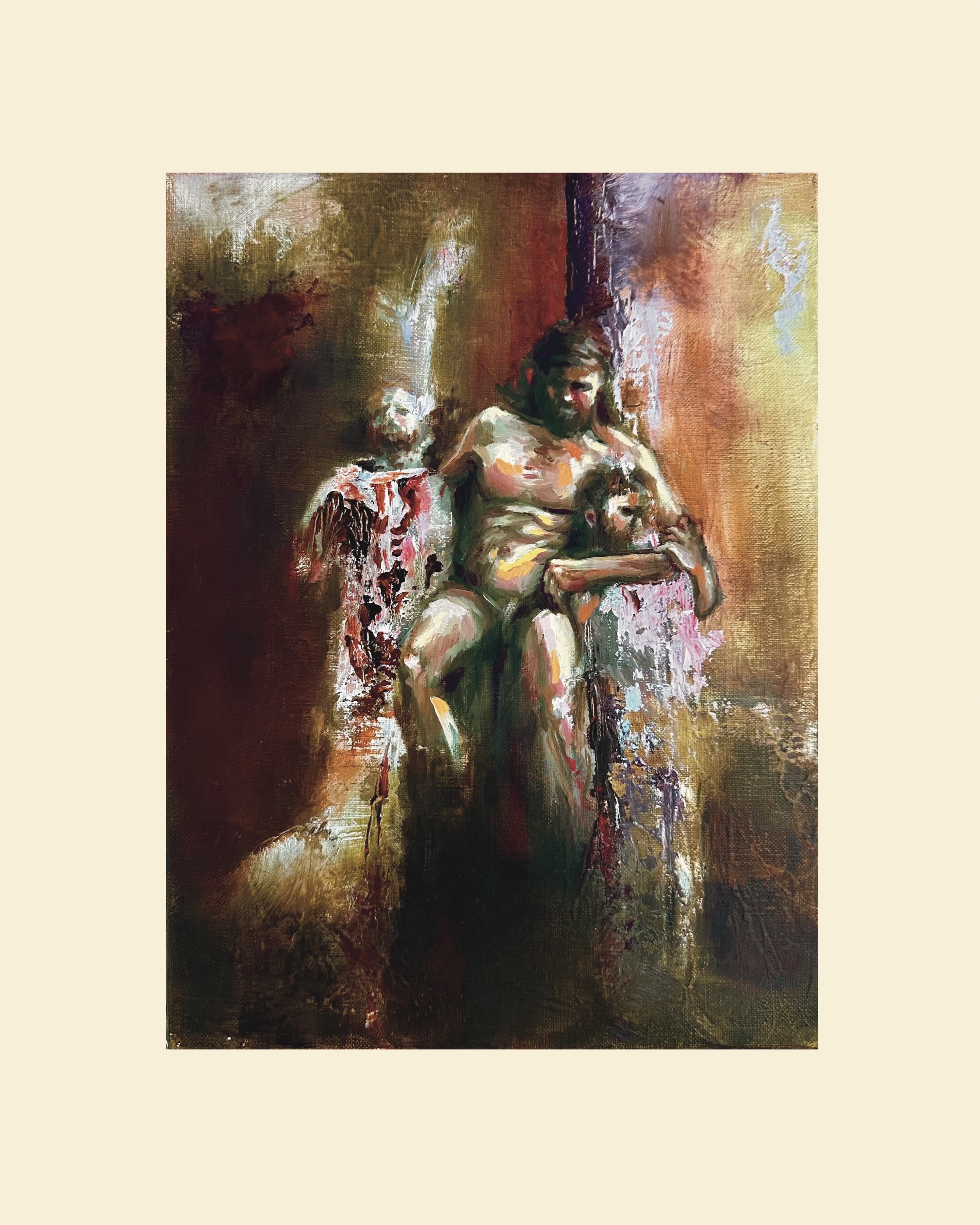

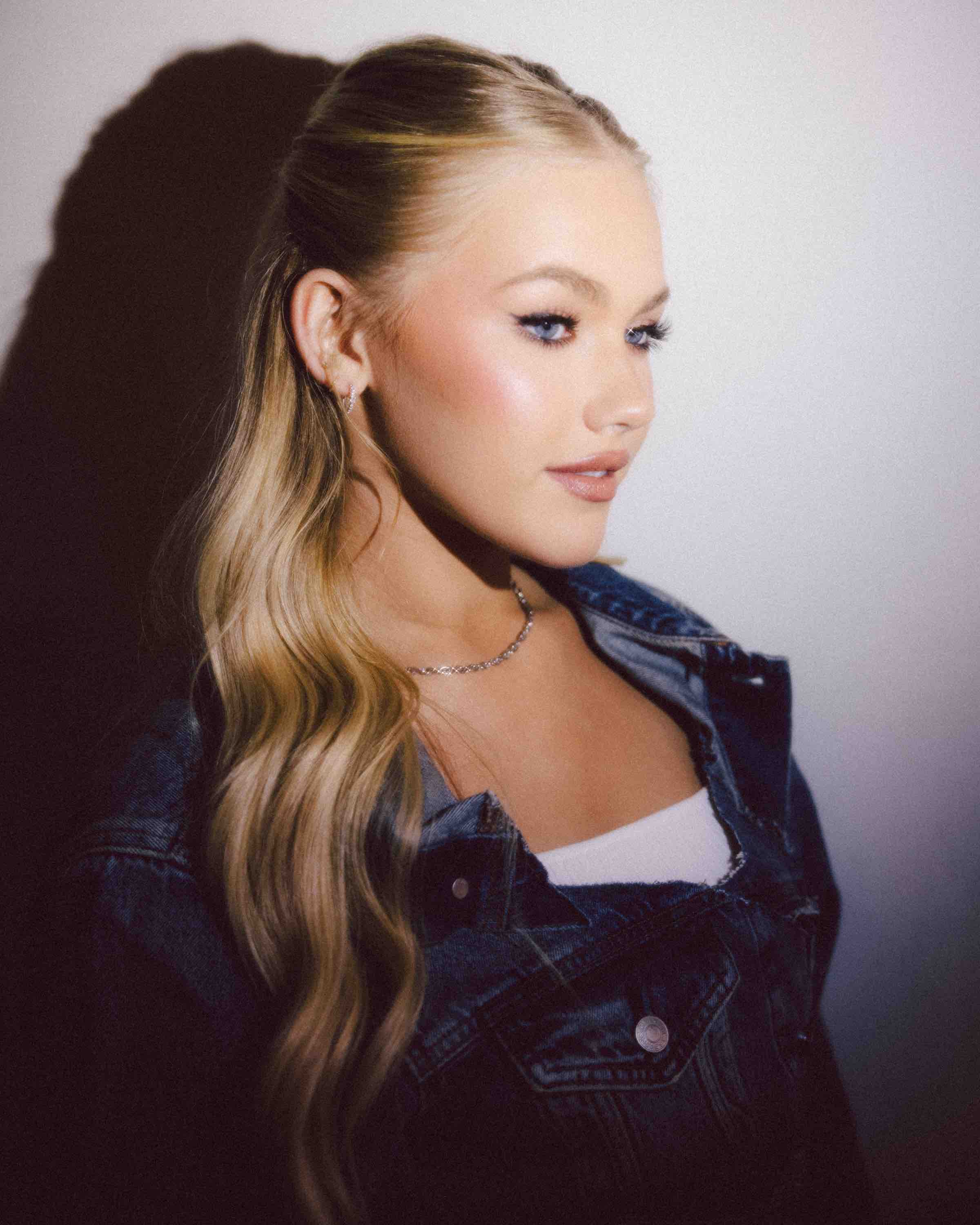
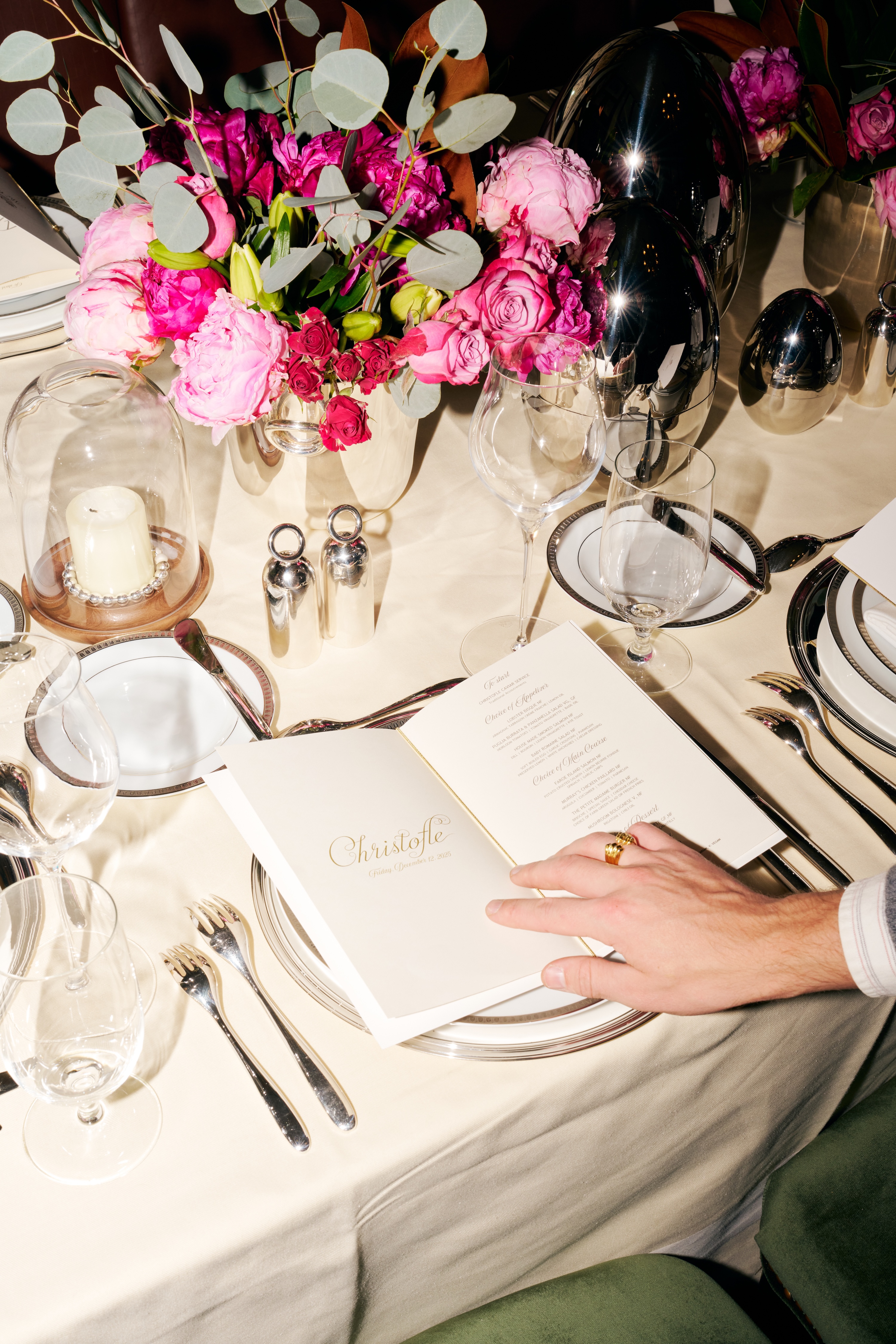
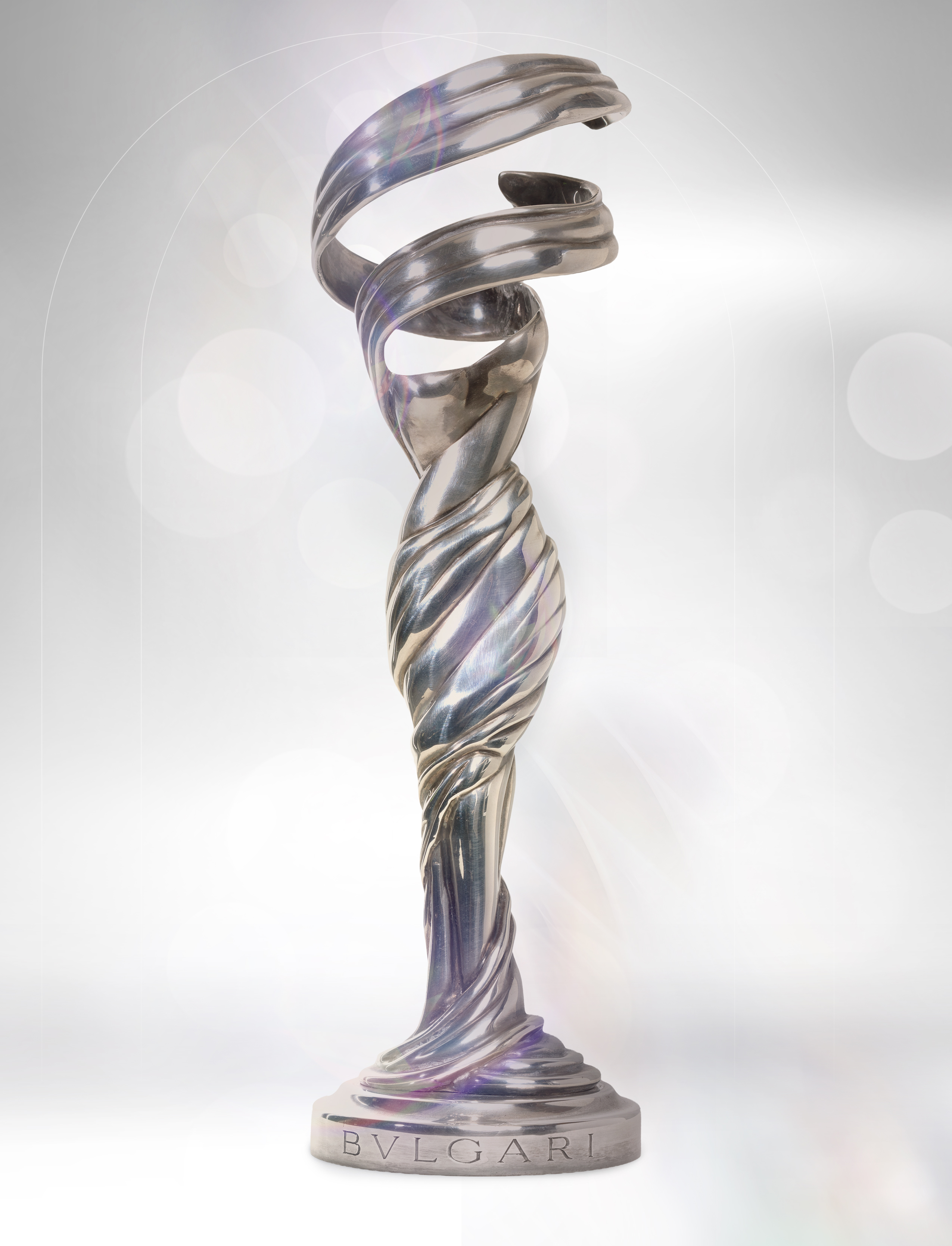
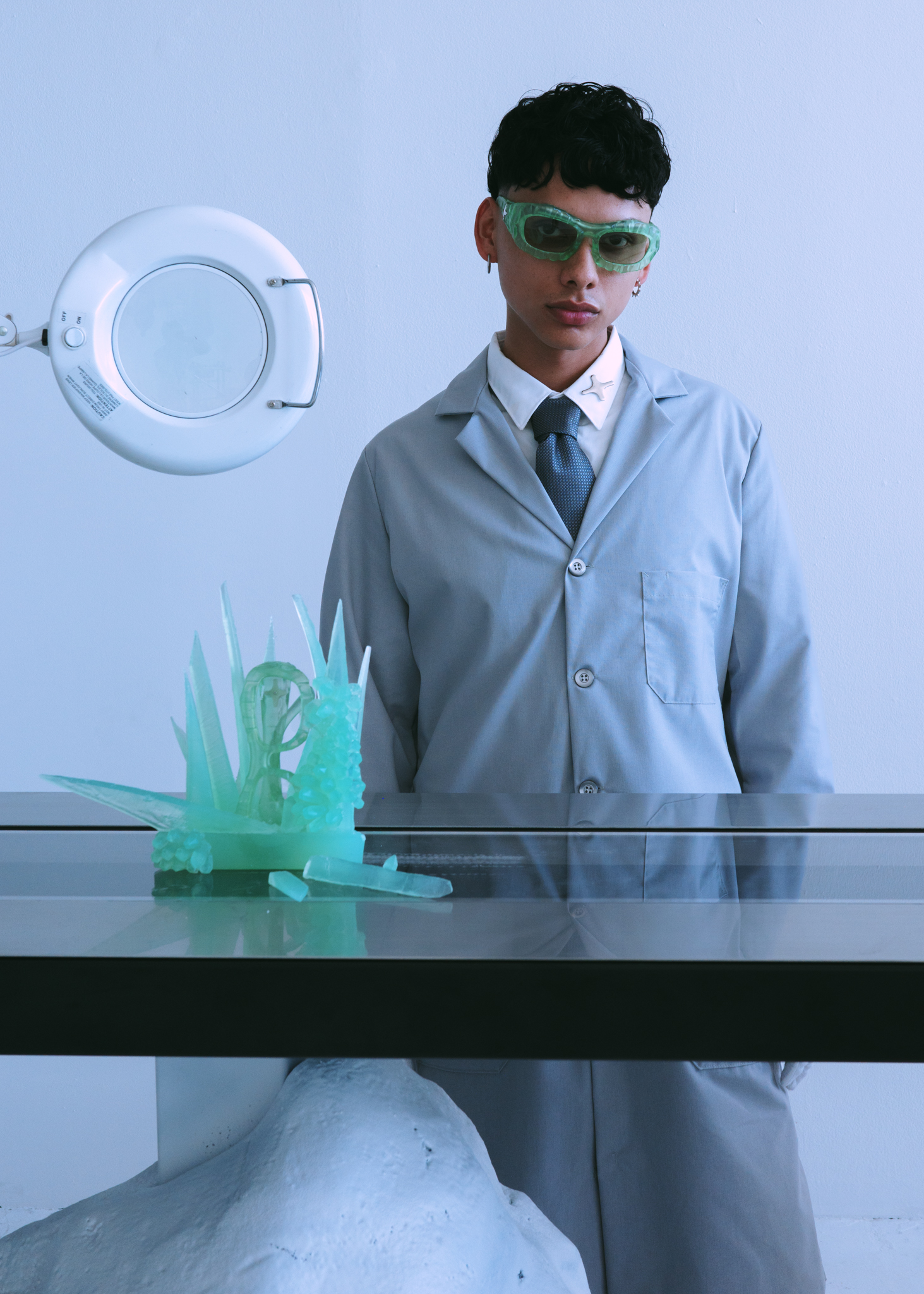

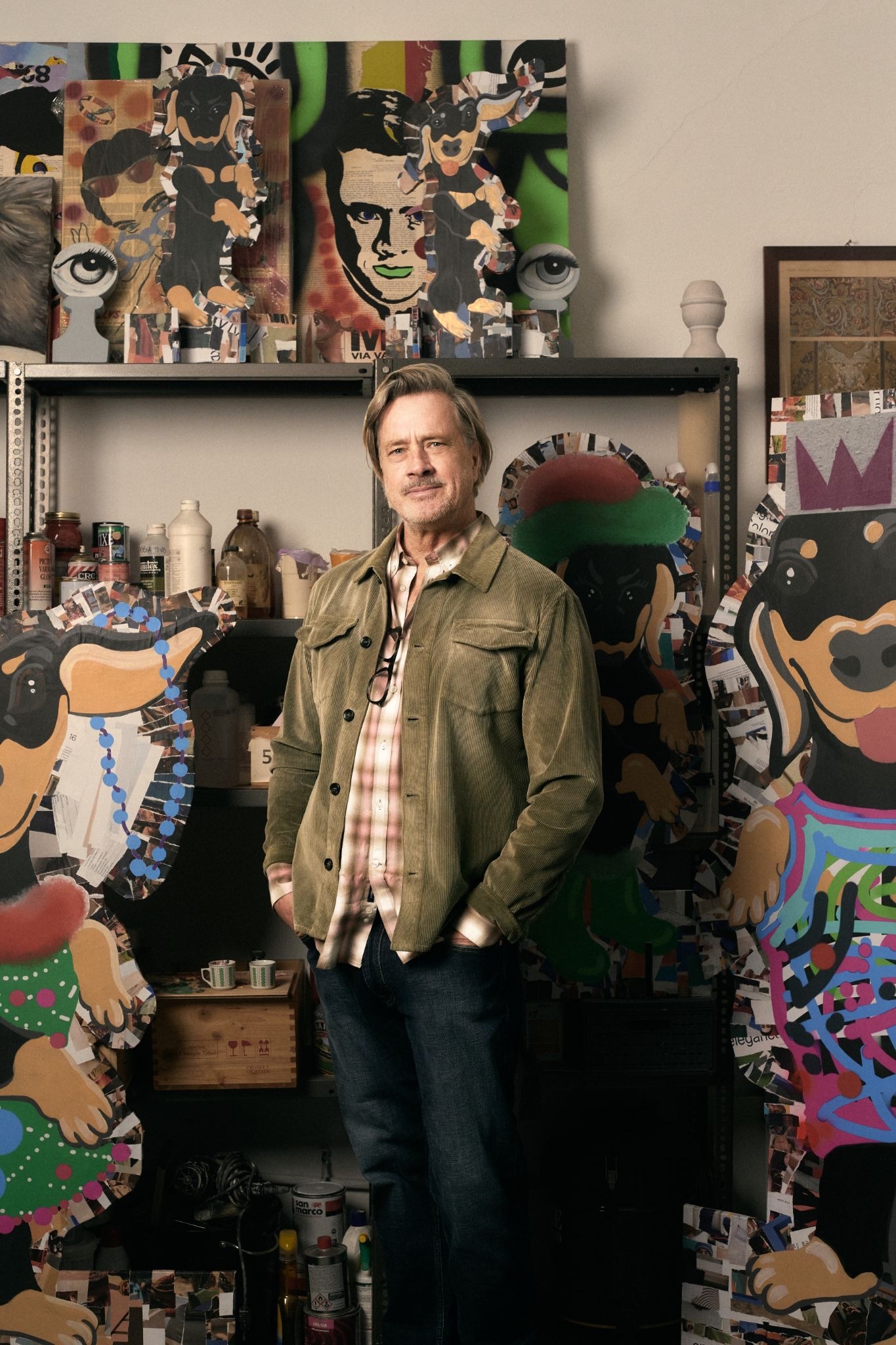
.JPG)
.jpg)
